Two news stories today prompted me to pick up the thread of the discussion I started in a previous blog post regarding Chris Wallace asking Michele Bachmann whether she was “a flake.” The latest Newsweek magazine has Sarah Palin on the cover, and the interview inside will undoubtedly stoke the “is she or isn’t she?” flames even more. Meanwhile, the latest Iowa poll now shows Bachmann ahead of Romney (although the lead is within the poll’s margin of error) and with much higher favorability/unfavorability ratings, capping her polling surge that began after the recent New Hampshire debate. With both women now in the top tier of Republican candidates, it is an opportunity to return to an issue I raised in my post regarding the Bachmann-Wallace contretemps – do women presidential candidates face a higher hurdle because of their gender? Note that I wasn’t the only one to wonder whether Wallace would have asked a man that same question. Shortly after my post, Wallace videotaped an “apology” in which he admitted that “I messed up”, even as he repeated the assertion that some people thinks Bachmann’s a flake. Several of you emailed me (all males who refused to post publicly!) to take issue with my question, arguing that Bachmann’s treatment reflected the fact she is, in fact, a flake. But not all of you hid behind the guise of anonymity: Anna Esten went on the record with some thoughtful comments that took issue with my post. Her comments remind me that the Bachmann/Palin candidacies may turn more on the generational divide in politics as on any gender gap.
Esten’s point is simple: we should stop thinking of Bachmann and Palin as female candidates, and instead treat them as candidates who happen to be female. As she writes: “The American people are still unable to see past gender stereotypes of protecting women. When men are asked tough questions, they should be able to stand up for themselves and fight back. When women are asked tough questions, it’s seen as mean. Simply, many believe that women shouldn’t have to experience the harsh environment of running for president, a belief that leaves those people thinking that women are inherently unqualified to hold such an office.
Women aren’t held to a different standard than men. We just haven’t yet seen a woman (in my opinion) strong-willed enough to take politics like a man, or find another way to prove their merit as a presidential candidate.”
Esten is part of the college-age cohort that came out so strongly for Obama in 2008 and who were least likely to support Hillary Clinton during the Democratic nominating contest. In the heat of the Clinton-Obama fight, I often asked my female students whether they felt any inclination to support Clinton because of the barriers women faced in electoral politics at the presidential level. For the most part, they looked at me like I had two heads. Gender just didn’t factor into their calculus. And yet, nationally, as the following Gallup poll shows, Clinton did attract stronger support among women Democrat voters than from men, who went more strongly for Obama.
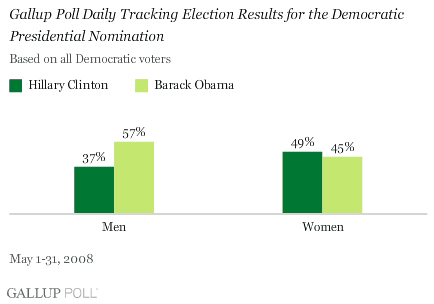
However, there was a definite generational skew to Clinton’s support among white women; the younger the voter, the less likely she was to support Clinton.
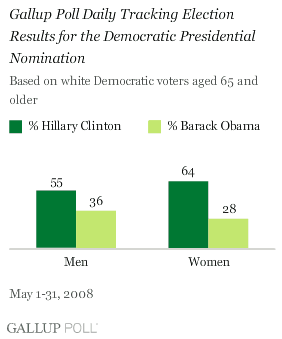
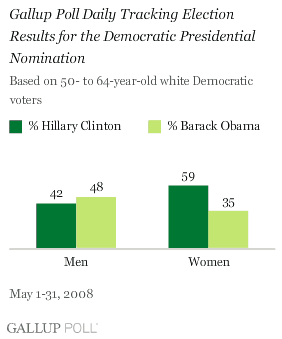
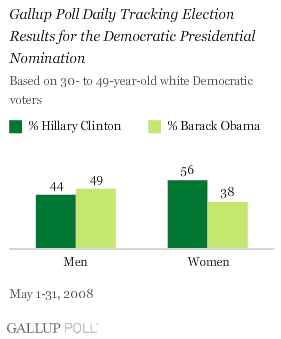
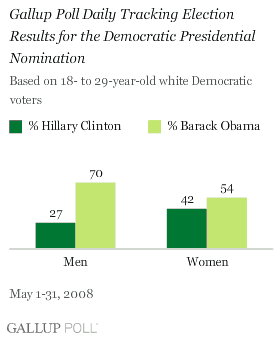
To be sure more than gender is at play here – income and education are also factors affecting Clinton’s relative support. Nonetheless, there’s a definite generational difference at play – there is a 22% polling difference in Clinton’s support between the oldest and youngest age cohort. Clearly, women who came of age when the barriers to their participation in politics were still very much in place were much stronger supporters of Clinton than were the younger women voters who benefited from the breaking of those barriers.
Of course, one last glass ceiling remains: in contrast to many democracies, we have yet to elect a woman president. Whether Bachmann or Palin can break through will depend in part on the relative influence of generational versus gender factors.
.
